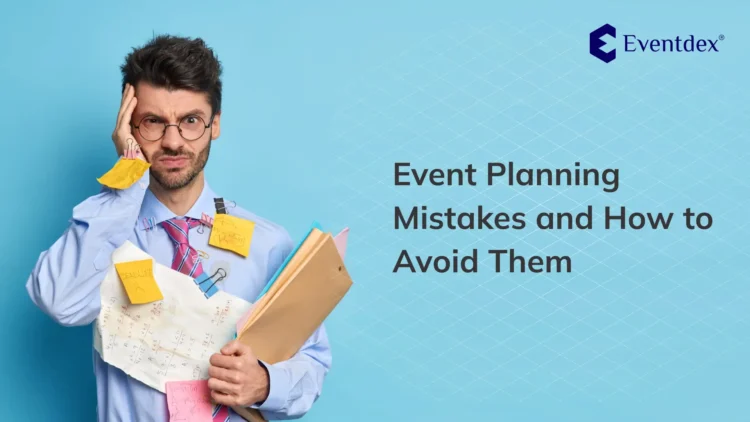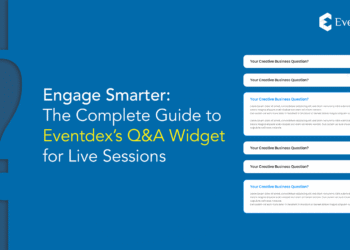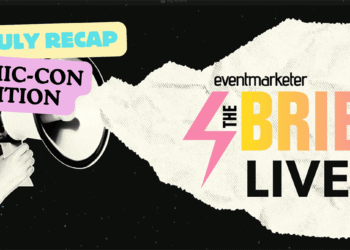Common Event Planning Mistakes and How to Avoid Them
Planning an event involves an intricate mix of creativity, coordination, and control, but even seasoned professionals fall prey to common event planning mistakes. From underestimating budgets to poor communication with vendors, small missteps can easily snowball into disruptions that affect the entire experience. In fact, research shows that nearly 61% of event organizers report logistical issues as one of their biggest planning headaches, while 43% struggle with staying within budget.
The reality is, event planning is not just about scheduling or securing a venue, it’s about orchestrating a memorable, high-quality experience for every attendee. And with so many moving parts, even the smallest oversight can have ripple effects that damage your timeline, your team morale, or your professional reputation.
This blog takes a practical look at what goes wrong, why it happens, and how to prevent it. With every misstep, we will help you understand the root cause and show you how to pivot before it’s too late.
Why Avoiding Mistakes Matters More Than You Think
Every event carries a story. Sometimes it’s told through flawless timing, thoughtful touches, and energy that flows effortlessly. Other times, it’s remembered for missed cues, awkward delays, or moments that didn’t quite land. What separates the two isn’t luck, it’s the way the details are handled from the very beginning.
Planning an event goes far beyond booking a venue or sending out invites. It’s about curating a complete experience, one that feels intuitive for attendees, runs smoothly for vendors, and reflects well on everyone involved. The truth is, even the most seasoned planners slip into familiar traps. It’s not about a lack of skill, it’s often about doing too much, too quickly, without the right systems in place.
The challenges usually don’t come out of nowhere. They build slowly like a communication gap,, a timing misstep, or relying on assumptions instead of clear direction. Most of these mistakes are preventable, but only if you know what to look out for. Because thoughtful, well-executed events aren’t just possible but expected.
Common Event Planning Mistakes You Must Avoid
No matter how experienced or detail-oriented you are, it’s surprisingly easy to fall into traps that compromise the quality of your event. The pressure to juggle timelines, vendors, attendees, and budgets can leave room for small errors, many of which have a way of snowballing. But the good news is: most of these issues are preventable. By recognizing the common event planning mistakes others have made before you, and by being intentional about your process, you can stay ahead of problems before they show up. Below are some of the most common event planning mistakes and how to steer clear of them with confidence.
1. Lack of a Clear Event Objective
Among the most common event planning mistakes, failing to define a clear objective early on can derail everything that follows. Without a concrete goal, every decision, from budgeting to venue selection, becomes guesswork. Are you aiming to educate? Generate leads? Celebrate a milestone? If you don’t articulate this from the beginning, you risk hosting an event that feels directionless to attendees and underwhelming to stakeholders.
Start by working with your team to develop a clear, measurable event objective. Tie it to broader organizational goals. For example, a nonprofit might set a fundraising target, while a tech brand may focus on lead generation or product demos. Whatever the goal, every detail should align with it, from the type of content you present to the follow-up strategy.
Establishing a shared objective also helps with vendor communication, marketing messaging, and post-event evaluation. It sets a standard to measure success and ensures everyone involved understands the event’s purpose. A well-defined objective is your roadmap; without it, you’re just hoping things work out. And in event planning, hope is not a strategy.
2. Underestimating the Timeline
Of all the event planning mistakes to avoid, underestimating the time required is one that nearly every planner stumbles into, especially when juggling multiple tasks. Planning an event is not something you can do last-minute. From venue bookings and vendor contracts to promotion and registration, everything needs lead time, and buffer time for when things go sideways.
Planners often underestimate how long approvals, printing, or shipping will take. One delay triggers another, creating a domino effect that leads to rushed decisions and stressful last-minute fixes. Booking a keynote speaker? They may need weeks to confirm. Ordering customized event badges? Allow for print errors and shipping delays.
Create a master timeline that maps out every milestone, starting from the event date and working backward. Include deadlines for each component, like securing vendors, launching promotions, and setting up rehearsals. Add built-in buffer days so that minor delays don’t spiral into major problems. Avoiding this common event planning mistake starts with respecting the calendar.
3. Poor Budget Management
Poor budgeting sits high on the list of top event planning mistakes. It’s easy to overspend on flashy elements and underestimate hidden costs like taxes, overtime labor, or technical support. Budget mismanagement doesn’t just hurt your bottom line; it can lead to cutting critical components last minute, which affects the event’s quality and credibility.
Start by identifying your must-haves versus your nice-to-haves. Allocate funds based on priority: venue, catering, AV, and marketing often take the lion’s share. Don’t forget contingency funds, at least 10% of your total budget should be set aside for unexpected costs.
Use budget tracking tools to monitor spending in real-time. This prevents surprises and allows you to pivot before it’s too late. Avoiding the common mistakes in event planning starts with visibility and control. The most successful events are not the most expensive ones, they’re the ones where the money was spent wisely.
4. Choosing the Wrong Venue
Selecting the wrong venue is one of the most common event planning mistakes and can affect everything from attendance to accessibility. A beautiful location is meaningless if it’s hard to get to, lacks parking, or is too small for your audience. A venue should complement your event’s purpose, not conflict with it.
When scouting locations, consider not just the aesthetics but also functionality. How many rooms do you need? Will you need Wi-Fi strong enough to support hundreds of users? Are there on-site technicians? What’s the policy for setup and teardown? Review floor plans, conduct site visits, and walk through the flow as if you were a guest.
Make sure your venue also aligns with your target audience. A luxury hotel ballroom might impress corporate sponsors but alienate grassroots community groups. The venue should make people feel comfortable, excited, and ready to engage.
5. Neglecting Event Promotion
Even the most well-planned event can fall flat without attendees. One of the event planning mistakes to avoid is assuming people will show up just because the event is valuable. Without strategic promotion, your audience won’t even know the event exists.
Start early with a marketing plan that includes social media, email campaigns, partnerships, and SEO-friendly content. Don’t just post event dates, tell stories, showcase speakers, tease the experience. Use countdowns, early-bird pricing, or giveaways to generate urgency.
If you’re working with sponsors, leverage their networks too. Give them branded materials they can share. Create a unique event hashtag to build conversation and track engagement. Consistency and creativity are your best friends here. Remember, promotion is not an afterthought, it’s half the battle.
6. Skipping a Risk Management Plan
Skipping risk management is among the common event planning mistakes that people only notice when things go wrong. Events are vulnerable to a range of unexpected issues: weather, speaker cancellations, tech failures, or medical emergencies. Hoping nothing will go wrong isn’t a plan, having a detailed contingency strategy is.
Assess your risks based on the type of event. Outdoor events should have backup indoor venues or tents. Virtual events need redundant internet access or pre-recorded content. Assign responsibilities to team members in case of emergencies. If a speaker is delayed, who steps in? If Wi-Fi fails, how do you adapt?
Have all insurance documents, vendor contracts, and emergency contact lists ready. Preparing for the worst ensures you’re not scrambling in crisis mode. Professionals aren’t people who never face problems, they’re the ones who prepare for them.
7. Weak Attendee Engagement
Planning logistics is important, but neglecting the guest experience is a top event planning mistake. An event shouldn’t just be attended, it should be experienced. Passive listening quickly leads to disengagement, especially in long or content-heavy sessions.
Build opportunities for attendees to participate. Use interactive elements like live polls, Q&A sessions, breakout rooms, and gamification. If your event includes speakers, encourage storytelling and interactive formats rather than slide-heavy presentations.
Utilize an event app where attendees can build their own schedules, network, and share insights. Keep them involved before, during, and after the event. Engagement isn’t a one-time moment, it’s a continuous journey that transforms attendees from spectators into participants.
8. Overlooking Accessibility and Inclusivity
One of the most common event planning mistakes is designing events that unintentionally exclude people. Accessibility and inclusivity are not optional, they’re essential. If your event is not accessible to people with disabilities or doesn’t account for diverse dietary needs, language barriers, or gender representation, you’re limiting your audience and harming your brand.
Make sure your venue complies with accessibility standards. Offer live captioning or translation services if needed. Provide gender-neutral restrooms and clearly labeled allergen-friendly food. Consult with experts or organizations that focus on inclusivity to audit your plan.
The more inclusive your event is, the more welcoming it feels. People remember how you made them feel, not just what you said. Planning inclusively is a sign of respect and professionalism.
9. Failing to Train Staff and Volunteers
Even if your logistics are airtight, untrained or poorly briefed staff can create chaos. Among the common mistakes in event planning, assuming everyone knows their role is a big one. Every person representing your event, ushers, tech staff, caterers, must know the plan and their part in it.
Hold detailed briefings and run mock drills where necessary. Provide printed cheat sheets or access to digital schedules. Make sure volunteers have a point of contact for questions. Assign zone captains to manage specific areas like registration, backstage, or guest services.
Clear, confident staff enhance the guest experience, solve problems quickly, and reflect the professionalism of the organizers. A great team can salvage a rocky moment. A confused team can turn a small hiccup into a disaster.
10. Ignoring Post-Event Follow-Up
The event isn’t over when the last guest leaves. One of the most overlooked but common event planning mistakes is neglecting the follow-up phase. You’ve invested time, money, and energy, don’t miss the chance to extend the impact.
Send thank-you emails to attendees, sponsors, and speakers. Include highlights, photos, or links to session recordings. Ask for feedback using simple surveys to find out what worked and what didn’t.
Use analytics from your event platform to evaluate attendance, session popularity, and engagement levels. Share wins on social media and with stakeholders. Solid follow-up helps retain attendees, builds relationships, and provides insights that make your next event even better.
Final Thoughts
Mistakes happen, but most of the common event planning mistakes above are avoidable with the right preparation, awareness, and attention to detail. Events are about experiences. When you treat each element as an opportunity to connect, communicate, and create impact, your event becomes more than just another date on the calendar.
Use this list not as a checklist of what could go wrong, but as a blueprint for what can go right. The more intentional your process, the more powerful your results. You don’t have to chase perfection, but you should aim for clarity, structure, and care in every decision you make.
Need help avoiding these pitfalls? At Eventdex, we understand what it takes to execute events that are flawless, engaging, and memorable. From registration to networking to real-time analytics, our event management software is designed to help you stay on track, avoid pitfalls, and create events that make an impact. For more details, book a demo with us today. Let’s plan smarter events together.


















